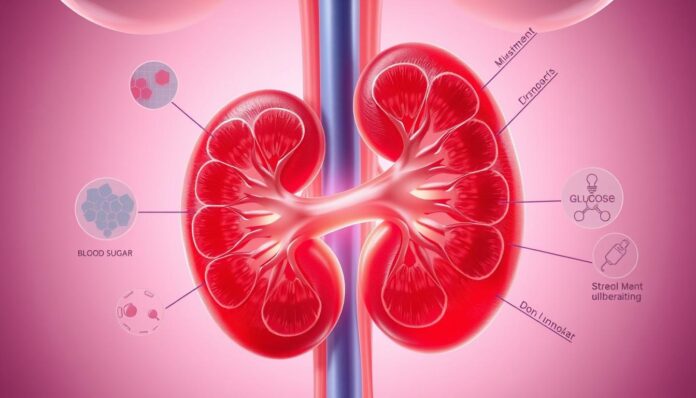Managing diabetes is key to avoiding diabetic kidney disease. This serious issue can harm your kidneys and even cause failure if not handled right. Diabetic kidney disease happens when high blood sugar damages your kidneys over time. It’s why managing diabetes is so important to stop kidney damage.
It’s crucial for people with diabetes to know about diabetic kidney disease. This knowledge helps them take steps to prevent it. By managing their diabetes well, they can lower the risk of kidney damage and keep their kidneys healthy.
Key Takeaways
- Diabetic kidney disease is a serious complication of diabetes that can lead to kidney damage and kidney failure.
- High blood sugar levels can damage the kidneys over time, making diabetes management crucial.
- Effective diabetes management can help prevent kidney damage and promote overall kidney health.
- Understanding diabetic kidney disease is vital for individuals with diabetes to take preventive measures.
- Diabetic kidney disease can be managed through a combination of lifestyle changes and medical treatments.
- Early detection and treatment of diabetic kidney disease can help prevent kidney failure.
Understanding Diabetic Kidney Disease
Diabetic nephropathy, or diabetic kidney disease, is a serious issue for people with diabetes. It can lead to kidney failure over time. Managing your blood sugar, blood pressure, and cholesterol is crucial to avoid this condition.
Diabetes makes your kidneys work harder to filter glucose. This can damage the blood vessels in your kidneys. Symptoms include swelling in your feet and ankles, fatigue, and trouble sleeping. It’s vital to watch for these signs and protect your kidney health.
To lower your risk of diabetic nephropathy, consider these steps:
- Monitor your blood sugar levels regularly
- Keep your blood pressure under control
- Manage your cholesterol levels
- Stay hydrated by drinking plenty of water
By following these tips, you can safeguard your kidneys and lower your risk of diabetic nephropathy. Early detection and treatment are key. They help manage the condition and prevent kidney disease symptoms from getting worse.
Early Warning Signs and Symptoms
Managing your diabetes means knowing about kidney disease symptoms. Diabetic kidney disease symptoms can be hard to spot at first. Look out for swelling in your feet, ankles, and hands, feeling tired, weak, and pale skin.
You might also feel nauseous, vomit, or lose your appetite. Some people don’t show symptoms until it’s too late. Regular doctor visits can catch kidney disease symptoms early. This lets you start treatment right away.
Some important signs to watch for are:
- Swelling in the feet, ankles, and hands
- Fatigue and weakness
- Pale skin
- Nausea and vomiting
- Loss of appetite
Knowing these early warning signs helps you take care of your kidneys. Spotting diabetic kidney disease symptoms early lets you work with your doctor. Together, you can create a plan to stop things from getting worse.
Early detection and treatment are crucial for kidney disease symptoms. Being proactive and watching for early warning signs is the first step. It helps protect your kidney health and overall well-being.
Risk Factors and Causes of Diabetic Kidney Disease
Managing your diabetes means knowing the risk factors for diabetic kidney disease. High blood sugar, high blood pressure, and high cholesterol are big causes. Smoking and a family history of kidney disease also raise your risk.
To lower your risk, control your blood sugar, blood pressure, and cholesterol. Use medicine, diet, and exercise. Quitting smoking and keeping a healthy weight also help. Here are important factors to think about:
- High blood sugar levels
- High blood pressure
- High cholesterol levels
- Smoking
- Family history of kidney disease
Knowing these risk factors and managing them can lower your risk of diabetic kidney disease. It’s also key to work with your healthcare provider. They can help monitor your kidney health and address any issues quickly.
Treatment Options and Management Strategies
Diabetic kidney disease treatment involves medication, lifestyle changes, and sometimes dialysis or kidney transplant. To manage it, take your meds as directed, eat healthy, exercise, and check your blood sugar and blood pressure.
Managing diabetic kidney disease means regular check-ups with your doctor. They’ll watch your kidney function and change your treatment if needed. You might work with a team of doctors, including a nephrologist, dietitian, and primary care physician, to get a plan that’s just right for you.
Some important parts of treating diabetic kidney disease include:
- Medications to control blood pressure and blood sugar levels
- Lifestyle changes, such as a healthy diet and regular exercise
- Monitoring kidney function and adjusting treatment plans as needed
By teaming up with your healthcare team and sticking to a detailed plan, you can manage your diabetic kidney disease well. It’s key to know about your condition and look into all treatment options and strategies to get the best results.
Prevention and Monitoring Your Kidney Health
To prevent diabetic kidney disease, managing your diabetes and health is key. Prevention starts with a healthy diet, staying hydrated, and regular exercise. It also means keeping your blood sugar, blood pressure, and cholesterol in check.
Regular monitoring kidney health is vital. Urine and blood tests can spot issues early. This allows for quick treatment. Regular check-ups with your doctor help you stay on track with your kidney care.
Here are some ways to care for your kidneys:
- Eat a balanced diet low in salt, sugar, and unhealthy fats.
- Drink plenty of water to stay hydrated.
- Exercise regularly to control blood pressure and sugar levels.
- Get enough sleep and manage stress.
By following these steps, you can prevent diabetic kidney disease. Remember, prevention and monitoring kidney health are essential for your kidney and overall health.
Conclusion: Taking Control of Your Kidney Health
Keeping your kidneys healthy is key when you have diabetic kidney disease. Knowing the symptoms, causes, and treatment options helps you take charge of your health. Work with your healthcare provider to create a treatment plan that’s just for you.
Go to your regular check-ups to keep an eye on your kidney function. This way, you can catch any problems early.
With the right steps, you can lower your risk of diabetic kidney disease. This improves your health and well-being. Stay alert, speak up for yourself, and keep managing your kidney health.
By doing this, you can live a better life and stop this condition from getting worse.
FAQ
What is diabetic kidney disease?
Diabetic kidney disease, or diabetic nephropathy, is a serious issue for people with diabetes. It happens when high blood sugar damages the kidneys over time. If not managed, it can cause kidney failure.
What are the early warning signs and symptoms of diabetic kidney disease?
Early signs of diabetic kidney disease might not be obvious. Look out for swelling in your feet, ankles, and hands. You might also feel tired, weak, and have pale skin.
Other symptoms include nausea, vomiting, and a loss of appetite. It’s important to watch for these signs.
What are the risk factors and causes of diabetic kidney disease?
Several factors can increase your risk of diabetic kidney disease. High blood sugar, high blood pressure, and high cholesterol are big ones. Smoking and a family history of kidney disease also play a role.
Lowering your risk involves managing your blood sugar, blood pressure, and cholesterol. This can be done through medication, diet, and exercise.
What are the treatment options and management strategies for diabetic kidney disease?
Treating diabetic kidney disease involves medication, lifestyle changes, and sometimes dialysis or a kidney transplant. To manage your condition, take your medications as directed.
Follow a healthy diet, exercise regularly, and keep an eye on your blood sugar and blood pressure levels.
How can I prevent and monitor my kidney health?
Preventing diabetic kidney disease starts with managing your diabetes and overall health. Eat a healthy diet, drink plenty of water, and exercise often. Keep your blood sugar, blood pressure, and cholesterol levels in check.
Regular kidney function tests can catch problems early. This allows for timely treatment and management.
Main References: National Library of Medicine




























